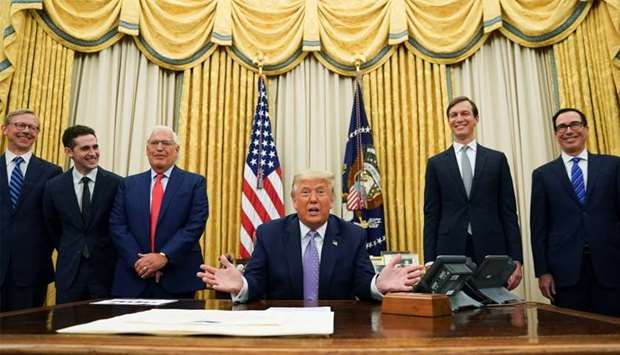Israel and the United Arab Emirates announced on Thursday that they will normalise diplomatic ties and forge a broad new relationship.
Under the accord, which US President Donald Trump helped broker, Israel agreed to suspend its planned annexation of areas of the occupied West Bank.
Israel had signed peace agreements with Egypt in 1979 and Jordan in 1994.
But the UAE, along with most other Arab nations, did not recognise Israel and had no formal diplomatic or economic relations with it until now.
It becomes the first Gulf Arab country to reach such a deal with the Jewish state.
Officials from the three countries called the accord "historic" and a breakthrough toward peace.
But Palestinian leaders, apparently taken by surprise, denounced it a "stab in the back" to their cause.
A joint statement said Trump, Israeli Prime Minister Benjamin Netanyahu and Abu Dhabi's Crown Prince Sheikh Mohammed bin Zayed had "agreed to the full normalisation of relations between Israel and the United Arab Emirates".
"As a result of this diplomatic breakthrough and at the request of President Trump with the support of the United Arab Emirates, Israel will suspend declaring sovereignty" over areas of the West Bank as envisioned in a US plan announced by Trump in January, it said.
Delegations from Israel and the United Arab Emirates will meet in the coming weeks to sign agreements regarding investment, tourism, direct flights, security, telecommunications and other issues, the joint statement said.
The agreement, to be known as the Abraham Accords, also gives Trump a foreign policy accomplishment as he seeks re-election on November 3. Speaking in the White House Oval Office, Trump said similar deals are being discussed with other countries in the region.
The UAE said it would remain a strong supporter of the Palestinian people, who hope to create an independent state in the occupied West Bank, Gaza and East Jerusalem, and that the agreement maintained the viability of a two-state solution to the longstanding Israel-Palestinian conflict.
In a televised address, Netanyahu said the deal would lead to "full and formal peace" with the UAE and voiced hope that other countries in the region would follow its example.
Palestinian President Mahmoud Abbas was holding meetings with aides.
Asked if the Palestinian leadership had been aware the deal was coming, Hanan Ashrawi, a veteran Palestinian negotiator, said: "No"
In Gaza, Fawzi Barhoum, a spokesman for the armed Islamist group Hamas, told Reuters, "Normalisation is a stab in the back of the Palestinian cause and it serves only the Israeli occupation."
The UAE's Sheikh Mohamed said the agreement would stop further Israeli annexation of Palestinian territories, for which Israel had been awaiting a green light from Washington.
Senior UAE official Anwar Gargash said the deal had helped defuse what he called a ticking time-bomb.
He urged the Israelis and Palestinians to return to the negotiating table.
The agreement will not secure peace in the region, a special adviser on international affairs to the speaker of Iran's parliament wrote on Twitter.
A signing ceremony is due to be held at the White House in the coming weeks.
United Nations Secretary-General Antonio Guterres welcomed "any initiative that can promote peace and security in the Middle East region," a UN spokesman said.
Palestinians reject deal, call Arab League meet
The Palestinian Authority on Thursday voiced its "strong rejection and condemnation" of an Israeli-Emirati deal to normalise ties, and called for an emergency meeting of the Arab League.
In a statement, Palestinian president Mahmud Abbas called the deal an "aggression" against the Palestinian people and a "betrayal" of their cause, including their claim to Jerusalem as a capital of their future state.

